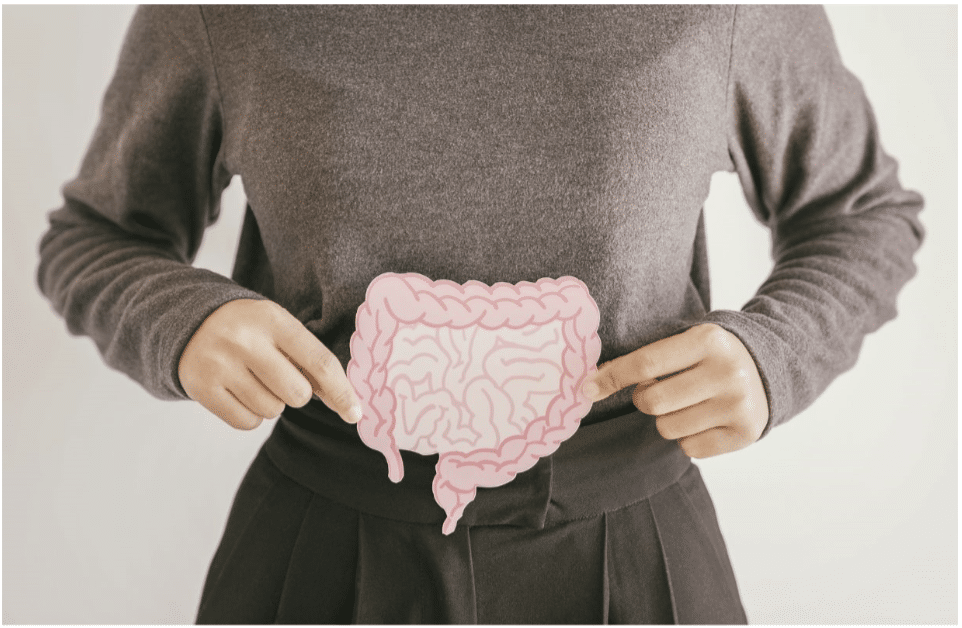

If you’re reading this, it’s likely that you have some digestive health concerns. You may
be wondering if your symptoms are “serious enough” to get help (psst- they are always
serious enough to get help) or are trying to find your best next step on your health
journey.
If so, read on to learn the top 5 signs we (digestive health dietitians) tell our clients to
look out for when it comes to their digestion and learn if it’s time for you to ask for help
with your symptoms!
Feeling like a balloon that won’t deflate? Persistent bloating could be your body’s way of
telling you that something’s not quite right. While the occasional bloat is normal, ongoing
discomfort might be a sign to pay attention to.
Our gut has its own way of communicating with us, and irregular bowel movements are
one of its messages. Whether it’s constipation or diarrhea, these disruptions might
indicate an imbalance in your digestive system. Working to bring back rhythm and
regularity could be just what you need.
If you find yourself dealing with persistent stomach discomfort, it’s time to address the underlying issues. Whether it’s heartburn, cramping, or general unease, your gut is trying to tell you something.
Surprised by that afternoon slump even after a good night’s sleep? Your digestive
health could be playing a role. The connection between gut health and energy levels is
strong, and optimizing your digestion might just be the energy boost you’ve been
searching for.
Believe it or not, your gut health can influence your mood. An unhappy gut might
contribute to mood swings, anxiety, or even feelings of sadness. Understanding this
connection is crucial for achieving holistic well-being, and we can work together to find
the right balance.

Digestive symptoms can be caused by various factors, and it’s important to note that
different individuals may experience symptoms for different reasons (which is why
working with a provider 1:1 can be so much more impactful than a cookie cutter meal
plan or restrictive diet).
Common factors we see in our clients include things like:
Emotional factors can contribute to digestive symptoms. Stress and anxiety can affect digestion and make symptoms worse. Gaining awareness of how stress and emotions impact your own digestion and learning how to navigate those impacts makes a big difference.
Lack of physical activity as well as high-intensity exercise can contribute to digestive problems. Tuning into your body’s responses and adjusting how you move your body can help.
Certain oral medications, such as antibiotics or non-steroidal anti-inflammatory drugs (NSAIDs), can sometimes cause digestive issues. Working with your physician and adjusting things like your medication timing can reduce these effects.
Injectable medications such as semaglutide or other GLP-1 receptor agonists may impact digestion and lead to uncomfortable gut symptoms. Communicating with your doctor about any concerning symptoms is important.
That said, for any gut-related issue it is important to identify underlying medical conditions so they can be treated appropriately with medical and nutritional interventions.
These may be:
Bacterial or viral infections: Infections of the digestive tract can lead to symptoms such as diarrhea, nausea, and abdominal pain.
Other medical conditions, such as diabetes or thyroid disorders, can impact digestion.
But again, influences and root causes will vary from person to person, and it’s likely that
multiple factors will need attention on your path to symptom relief!
Digestive problems can impact your ability to feel present in life, your stress levels, your
relationships and so much more. It can feel frustrating to go from doctor to doctor or
article to article looking for answers but never really feeling like anyone sees you.
Which is why we are dedicated to helping you break that cycle for good.
If you are struggling with any of the symptoms or conditions mentioned above, or have
something else going on that you suspect may be related to your gut health, know that
healing is possible.
Our team of dietitians has helped hundreds of people find freedom from their symptoms
and a better overall quality of life through 1:1 nutrition counseling. We explore each of
our clients’ own unique factors and implement realistic and sustainable strategies so
they can achieve long-term relief and thrive.
Most of our clients would agree that there’s no “quick fix.” (If there was, we wouldn’t
need to write this blog!) And while it can be challenging to see the impact of small
changes in the beginning, little improvements add up to big results over time.
Every person’s journey to healing is going to look different, but you do not have to walk
that journey alone. We are here to support you and cheer you on every step of the way.
Let’s work together to help you get to the root cause of your symptoms and experience
the life you deserve!

We are a group of dietitian specialists based in Oklahoma offering virtual nutrition therapy for digestive health and disordered eating recovery.
We love working with individuals who are ready to find relief from gastrointestinal (GI) symptoms and embrace a more positive relationship with food and their bodies.
Offering virtual nutrition counseling services in Oklahoma, Texas, West Virginia, and other select states.